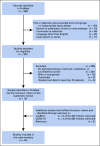Effect of Cancer on Clinical Outcomes of Patients With COVID-19: A Meta-Analysis of Patient Data
- PMID: 32511066
- PMCID: PMC7328119
- DOI: 10.1200/GO.20.00225
Effect of Cancer on Clinical Outcomes of Patients With COVID-19: A Meta-Analysis of Patient Data
Abstract
Purpose: Whether cancer is associated with worse prognosis among patients with COVID-19 is unknown. We aimed to quantify the effect (if any) of the presence as opposed to absence of cancer on important clinical outcomes of patients with COVID-19 by carrying out a systematic review and meta-analysis.
Methods: We systematically searched PubMed, medRxiv, COVID-19 Open Research Dataset (CORD-19), and references of relevant articles up to April 27, 2020, to identify observational studies comparing patients with versus without cancer infected with COVID-19 and to report on mortality and/or need for admission to the intensive care unit (ICU). We calculated pooled risk ratios (RR) and 95% CIs with a random-effects model. The meta-analysis was registered with PROSPERO (CRD42020181531).
Results: A total of 32 studies involving 46,499 patients (1,776 patients with cancer) with COVID-19 from Asia, Europe, and the United States were included. All-cause mortality was higher in patients with versus those without cancer (2,034 deaths; RR, 1.66; 95% CI, 1.33 to 2.07; P < .0001; 8 studies with 37,807 patients). The need for ICU admission was also more likely in patients with versus without cancer (3,220 events; RR, 1.56; 95% CI, 1.31 to 1.87; P < .0001; 26 studies with 15,375 patients). However, in a prespecified subgroup analysis of patients > 65 years of age, all-cause mortality was comparable between those with versus without cancer (915 deaths; RR, 1.06; 95% CI, 0.79 to 1.41; P = .71; 8 studies with 5,438 patients).
Conclusion: The synthesized evidence suggests that cancer is associated with worse clinical outcomes among patients with COVID-19. However, elderly patients with cancer may not be at increased risk of death when infected with COVID-19. These findings may inform discussions of clinicians with patients about prognosis and may guide health policies.
Conflict of interest statement
The following represents disclosure information provided by authors of this manuscript. All relationships are considered compensated unless otherwise noted. Relationships are self-held unless noted. I = Immediate Family Member, Inst = My Institution. Relationships may not relate to the subject matter of this manuscript. For more information about ASCO's conflict of interest policy, please refer to
Open Payments is a public database containing information reported by companies about payments made to US-licensed physicians (
No potential conflicts of interest were reported.
Figures
References
-
- International Agency for Research on Cancer: Press Release N° 263. Latest global cancer data: Cancer burden rises to 18.1 million new cases and 9.6 million cancer deaths in 2018. https://www.who.int/cancer/PRGlobocanFinal.pdf.
-
- Sawyer A, Straiton J: Are cancer patients more vulnerable to COVID-19? BioTechniques. https://www.biotechniques.com/coronavirus-news/news_are-cancer-patients-...
-
- Bauchner H, Golub RM, Zylke J: Editorial concern-possible reporting of the same patients with COVID-19 in different reports. JAMA 10.1001/jama.2020.3980 [epub ahead of print on March 16, 2020] - PubMed
-
- Tool to Assess Risk of Bias in Cohort Studies. Contributed by the CLARITY Group at McMaster University. https://www.evidencepartners.com/wp-content/uploads/2017/09/Tool-to-Asse....
Publication types
MeSH terms
LinkOut - more resources
Full Text Sources
Medical
Miscellaneous





